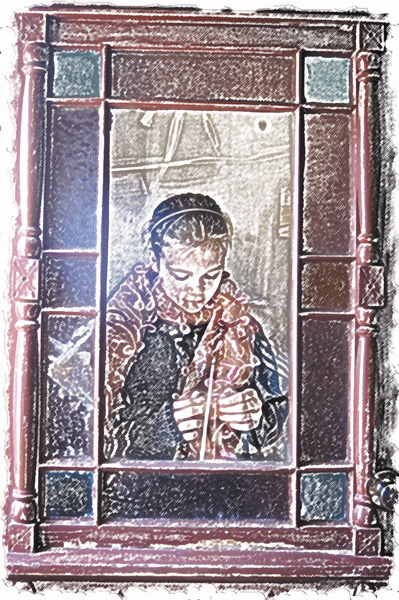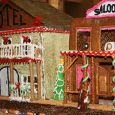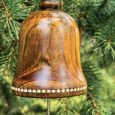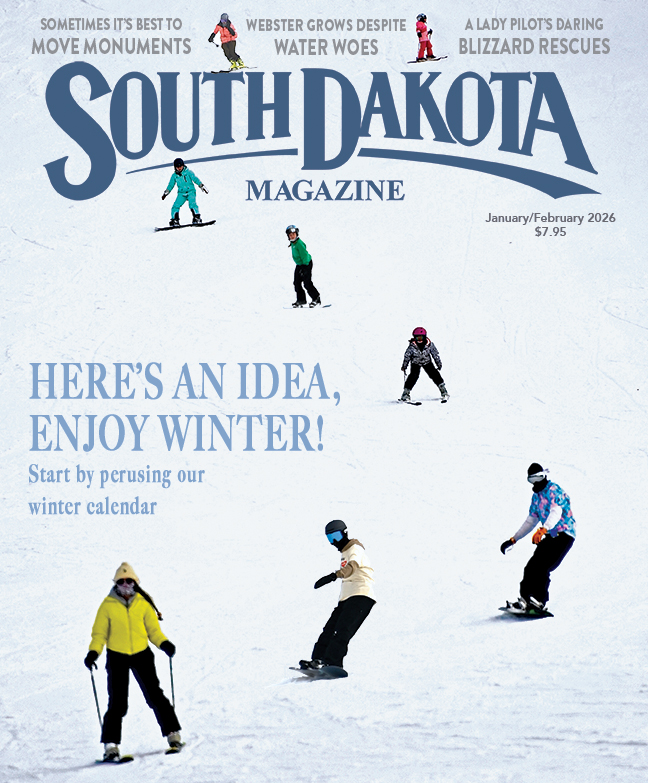The Gift of South Dakota
Subscriptions to South Dakota Magazine make great gifts!
Subscribe today — 1 year (6 issues) is just $29!
Christmas at Wounded Knee
 |
My grandparents were sent to the Pine Ridge Reservation as Presbyterian missionaries from their home at a newly established Christian colony located on Wakpaipaksan, the Bend of the River, at what is now known as the town of Flandreau. They left before the turn of the century in a wagon loaded with camping gear, implements, provisions and other necessities.
Grandfather's ministry on the Pine Ridge continued for four long decades. We lived in Allen and Porcupine during those depressing years of the "Dirty Thirties." Grandfather was struggling under some of the most adverse conditions. Missionaries were paid woefully inadequate salaries for those times, but their efforts continued faithfully. There began a gradual increase in membership in our churches, because the Christian faith offered hope for people in despair.
One particular winter, he was serving two churches; one was at our home in Porcupine and the other was the historic village of Wounded Knee, located 7 miles to the south. During the winter months, I made many sleigh trips with my grandfather. We used that means of winter transportation out of necessity and not as a luxury.
The most memorable Christmas experience for me was when I was invited to accompany grandfather to a celebration at our little church in Wounded Knee. Immediately before Christmas, Indian families residing in the outlying areas came to our Porcupine church to pitch their tents and remain for the duration of the holidays. It was an exciting time, especially for a little boy. There, a great celebration was concluded on Christmas Eve.
At noon on Christmas Day, there had been a great feast at our church at Porcupine where members of the Christmas encampment generously shared their food and enjoyed fellowship. It was a time of great rejoicing. The second celebration was to be held at our little church at Wounded Knee that same evening.
It was Christmas Day as grandfather began loading our sleigh in preparation for our trip to Wounded Knee. Missionary boxes containing gloves, mittens, stocking caps and other useful gifts were carefully packed in the back of our sleigh.
Grandmother had made me a muff to keep my hands warm during the trip. She even heated bricks in the oven and placed them at our feet. She also put a big wool blanket on the seat for additional warmth in case of an emergency. Grandfather pulled a great lap robe to cover our lower extremities. All was in readiness. Grandmother added a basket of food and gave me a reassuring hug. She always gave me special attention. Finally, she made an extra wrap of the big wool scarf around my neck. With a twinkle in her eye and a beaming smile, she waved to us. Her last words to me before our departure were, "Keep warm, takoja."
It was mid-afternoon when grandfather spoke gently to our little ponies. They eagerly responded to his command and we left as the people cheered. The little ponies seemed to sense there was something festive about this trip. They nodded their heads and quickened their pace in the glistening snow. It was as if they were dancing as the jingle of the chains kept in time with their trotting hooves. I, too, was caught up with the excitement of the moment. The beautiful landscape made me feel like we were soaring in the clouds. Only the slight swishing sound of the sleigh runners told us we were on solid ground.
When we finally arrived at the little church; the glowing red sun was just beginning to touch the western horizon. There was a group of parishioners eagerly awaiting our arrival. The men were dressed in sheepskin coats, which were popular in those days. The women covered themselves with warm woolen shawls. The local committee began unloading the boxes.
A distinguished elder opened the door and cordially bade us to come in. The place was packed with Indian families and all had smiling faces. A grandmother came over and helped me remove my wraps. She invited me to open my hands to the big potbellied stove in the center of the room. Then she had me sit next to her in the front of the church. She knew I was being reared by my grandparents and wanted to make sure I was given proper attention, as is our Lakota tradition. The church bell rang and echoed through the hills to announce the beginning of the evening's service.
Grandfather taught that in the Lakota way we are always to express gratitude (wopila) for gifts.
There was a pleasant fragrance from a freshly cut cedar Christmas tree and also from some of the boughs, which were made into beautiful wreaths. These decorations were artistically displayed on the interior walls of the sanctuary. There was also the sweet smell of fresh apples, as many boxes of the fruit were stacked near the tree. At regular intervals, one of the local elders would stoke up the stove while another man pumped up the Coleman gas lanterns, which were suspended from the ceiling. In those days, none of our Lakota churches had electricity.
Then there was a visit from a fat man dressed in a red suit. English speaking people call him Santa Claus, but Lakotas call him Waziya or the Northerner. This one needed an interpreter to convey his greeting in the Lakota language. He also had a keen sense of humor and kept the congregation shaking with laughter. Strangely, he wore a long white beard and displayed a pink face, but he had brown hands like a Lakota.
The excitement rose to a momentous crescendo when it was time to distribute the gifts. Names on the tags were read aloud by committee members and the packages were delivered to the designated recipients. Seeing a little girl clutching a doll tightly with her dark eyes shining brightly and wearing a big smile was a joy to behold for a little boy like me. I had already received my gifts at our Porcupine church. I saw a boy wearing a stocking cap that matched his mittens he was putting on. He too had a big smile on his face. There was something like electricity in the air, especially for the little ones. Everyone was happy!
The grandmother who made me sit next to her brought me a box that contained a beautiful hand-knit sweater. She asked me to try it on. It fit perfectly! She smiled and gave me a big hug. Grandfather taught that in the Lakota way we are always to express gratitude (wopila) for gifts. I shyly extended my hand and politely said, "Thank you grandmother. You are a very kind woman." I forgot to ask if she had knitted the sweater for me. Other grandmothers also brought me gifts.
When this distribution was completed, an elder got up and instructed us to remain in our seats. Women, almost like magic, produced dishes and utensils that had been wrapped in cloths. From the doorway men brought in pots of food that had been kept warm on cooking fires on the church grounds. Grandfather was asked to offer the blessing. Amid the clatter of dishes and the laughter of children a great feast was enjoyed. At the conclusion of the meal, the elder announced there would be a Christmas dinner the following noon.
The grandmother helped with my wraps and instructed grandfather to follow her family in our sleigh. They had a spare bed where we could spend the night. The horses were fed and watered. I brought in our spare bedding in case we needed additional warmth during the long, cold night. A cast iron wood stove provided all the heat we needed and we slept like logs.
We ate a leisurely breakfast over cups of strong, black coffee, which was grandfather's favorite pleasure. Our horses were properly cared for as they were always given first priority. Grandfather spoke to them affectionately, like people, in the Lakota language. They seemed to understand. After all, they were Indian ponies! I enjoyed those special moments when grandfather spoke to the animals in this fashion.
Just before noon we headed back to the church. A crowd of people was gathered there. An elder greeted us and showed us to our seats on the platform where a table was set for special guests, including a shy little boy. After a few speeches by members of the local committee, an announcement was made by a woman about the distribution of the food. There was a brief service of devotion and a prayer. The feasting began. The food was delicious and plentiful. Two lard pails were filled with extra food for grandfather and me to take home. The Lakotas call it wateca. It was a happy time for the humble folk who came together as a people of God to express their gratitude. When the feast was concluded, a final hymn was sung and grandfather gave the closing prayer. Many came to clasp our hands and grandmothers embraced me tenderly.
It was past noon when we finally left in our sleigh. I was cozy and warm wearing my new sweater under my coat. Grandfather carefully tucked me under our lap robe again. I observed our little ponies and there seemed to be just a hint of playfulness in their manner. It was almost as if they too were caught up in the festivities of the previous night. My grandfather chuckled as he spoke to them. They resumed their prancing in the sparkling snow. I called the ponies by name. Then I repeated what the children from the day school said during the evening program at our church. I shouted in English, "Merry Christmas!" Grandfather laughed louder and the ponies danced harder.
Editor’s Note: Sidney H. Byrd followed in his grandfather's footsteps and served the Presbyterian church. He died in 2016 at age 97. This story is revised from the November/December 2000 issue of South Dakota Magazine. To order a copy or to subscribe, call (800) 456-5117.










Comments